Abstract
Continuing education of adults, including continuing professional education, is increasingly looked upon as a resource for developing the human capital of countries. An important place in this is taken by continuing pedagogical education in conditions of establishment of the National System of Teacher Growth and introduction of the National System of Qualifications. In this regard, the article discusses some of the results of a cross-cultural study on identifying the understanding by educators of the requirements of professional standards, conducted by North-Eastern Federal University at the invitation of its scientific and educational partner, the Institute of Psychology and Education of Kazan Federal University. This article identifies the basic factors that can affect the quality of continuing professional education and its development in the context of continuity as the formation of an open informational-educational environment (environmental factor), development of adult education in the region, and person and application focused, or, in other words, contextually professional focused continuing professional education.
Keywords: Professional and personal developmentcontinuing professional educationlifelong pedagogical educationNorth-Eastern Federal University
Introduction
In the modern, rapidly changing world, transformations affect all spheres of society including processes in education: multiple changes in “professional careers” throughout a person’s life and the requirement for lifelong education (continuing learning) (Volkov, 2016). Among them an important place is taken by the accelerating rate of social development, increasing mobility of people and expanding opportunities for them to choose their own place and way of work and education, massification of education (growing share of learners in universities in all age categories, regions and countries), creation of new ways of thinking and creativity, and others. Socialisation is a “natural, expected process of social development that defines the personal growth of people, the direction and qualitative self-change of their sociality throughout their whole life” (Mardakhaev, 2018, p. 2).
There is no doubt that the availability of continuing lifelong professional and personal development of a person, which promotes the realization of his or her social potential in various professional spheres with fulfilment of different social roles, dynamic changes in social values and priorities, development of professional and personal qualities that allow him or her to successfully work and efficiently overcome stress, gaining new focus in life, and, if needed, to change his or her sphere of professional activities (Tarkhanova, 2014), plays a positive role in the subjective evaluation by the person of his or her quality of life, evoking the feeling of professional and personal satisfaction. Professional success here is measured by the level of his or her personal contribution to the system of his or her professional and social relations, by how actively he or she participates in their development or transformation. It is the latter that is considered by researchers to be the process of a person’s self-realization, in which the continuing professional education plays a significant role, allowing for the development of individual capabilities, needs, intentions, and goals through a variety of types and forms of social interaction in an educational process, oriented towards persons and society.
It should be noted that continuing education, which also includes continuing professional education, is always considered from andragogical point of view, meaning the education of adults, when they gain new life, social, and professional experiences, develop their social and professional skills, and understand their new social role and their place in the society, and so on (Petrova, 2015).
Problem Statement
The social function of adult education is in forming a professional sphere of consciousness (worldview), a culture of professional conduct that is established and accepted in the corresponding society (pedagogical, psychological, engineering etc.), confirmation of the social role in the society, formation of a certain relation towards the world of things and phenomena, determined by the deontology of professional activities (Mardakhaev, 2017). Thus, it is the continuing education (along with self-education and self-development) that gives a person an opportunity for complex creative changes throughout life.
Research Questions
The study among the educators of Yakutia and Kazakhstan in 2015-2017 shows that one of the most important factors that affect the evaluation by a person of his or her well-being is the worldview component and, first of all, the understanding by an educator of the meaning of his or her professional activity in the context of personal existence, which allows for a response to new challenges that constantly arise before him, to overcome crisis factors in his or her profession, including the capacity to be aware of the reality and objective possibility of professional and personal deformations and to be able to prevent them. Professional deformations may destroy the social health of a person, which is understood as a complex feature of personality of a person who can resist destructive factors of the sociocultural environment of life and who can actively express his or her moral position (Mardakhaev, 2016).
This makes apparent the social role of professional and personal development of a person and of his or her professional and social competencies in the process of continuing professional education. A special place in this is taken by communication skills (capability for communication with others, ability to understand others, capacity to empathise with others, competence in the use of conversation skills), social adaptability, focus on resolving problems, and the ability to find constructive solutions to problematic situations (Tarkhanova, 2014). In connection with this, on the example of educators, we can say that the most important goals of continuing professional education must be the strengthening of its spiritual and moral aspect and implementation of the context of social and moral content of professional activities of adult learners.
Purpose of the Study
Considering the above, it is necessary to define the principal vectors of development of continuing professional education in NEFU, taking into account global and local trends, as well as challenges posed by them.
One of the priority tasks is to expedite the development of digital learning, including the development and introduction of mass open online courses, completely or partially free for the learners, in order to ensure the mass character and accessibility of continuing professional education as part of the social responsibility of the federal university. Digitalisation of education can give to the society massive resources for developing human capacity and improving quality of life. However, the principal focus should not be on information and communication technologies nor on digital educational devices, but on a “person as a triune of spirit, soul and body, who has unlimited potential for improving the quality of education, and with its help, of the quality of life of the person and the society” (Verbitsky, 2018, p. 76).
Due to the digitalization of the economy and the stricter qualification requirements for specialists to conform with professional standards, the issue of the lack of research and teaching specialists for training highly qualified professionals that will be in demand in the labour market becomes ever more topical.
Research Methods
Methods of research and problem solving: conducting surveys via questionnaires among the participants of the cross-cultural study, analysis of statistical data.
The cross-cultural study, organised in 2017-2018, was aimed at identifying the understanding of professional standards by educators in five countries. The participating countries included Scotland, Portugal, Russia (1st stage), Canada, and Australia (2nd stage). This project is connected with the topic of a research work which is currently being held in Scotland. Its results will be presented in conferences and published in journals and will also be available in the public domain.
Findings
North-Eastern Federal University, at the invitation of its scientific and educational partner, the Institute of Psychology and Education of Kazan Federal University, organised the participation of educators from the Sakha Republic (Yakutia) in a cross-cultural study in order to conduct a comparative analysis of the thoughts of educators from various countries relating to professional standards. Some of the results of the study were as follows, with numbers from 1 to 5 denoting the level of agreement with the presented statement, as well as two options for completely agreeing or disagreeing with it (Figure
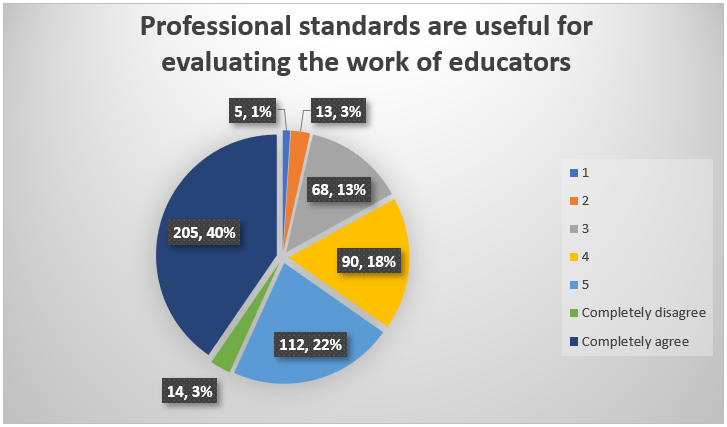
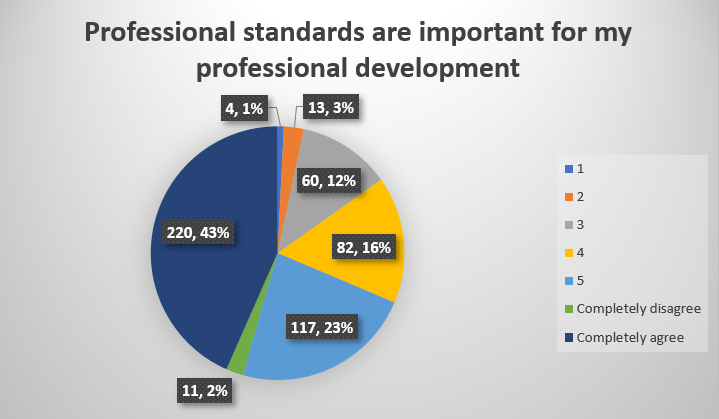
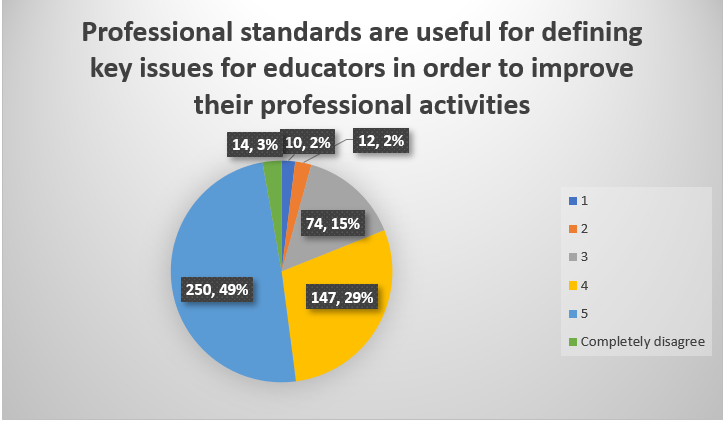
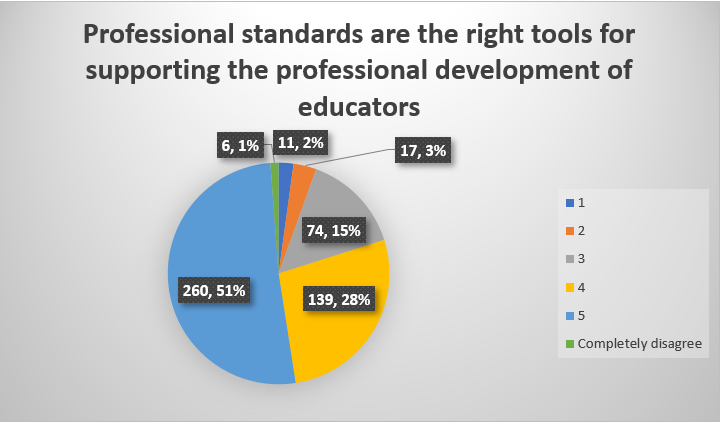
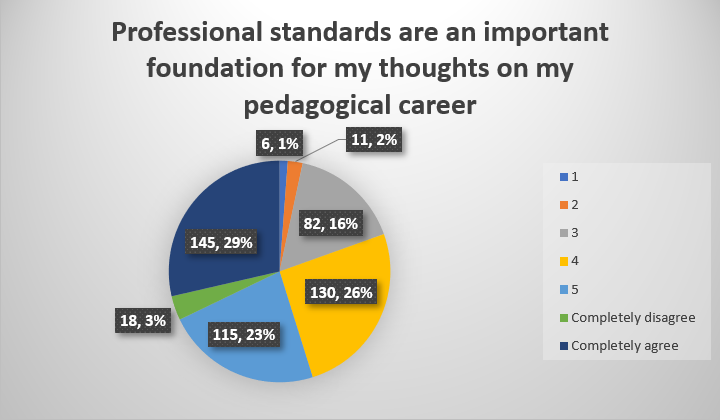
It is necessary to study the methods and the best Russian and European experiences and practices in improving the quality of managing modernisation processes, connected with the global digitalisation of education: development of digital competencies of not only students, but also of teachers; introduction of best practices in implementing innovative technologies in the educational process; development of electronic education, including education for vulnerable students; ensuring the open character, accessibility and mass nature of education for all categories of the population, including the residents of remote and Arctic territories.
There is a need for resolving the following tasks:
integration into the digital Russian and international academic-teaching environment;
development of digital andragogy;
continuing professional education for managers of educational institutions at all levels;
training of IT specialists using the digital system of continuing professional education;
introduction of virtual and augmented reality tools;
digitalisation of educational processes: digital paperwork, digital analysis, improvement, development and implementation of online courses of additional professional education, including interdisciplinary and massive open online courses (in the next two years: digitalization of all academic learning resources, creating digital online courses for all educational curricula, improving the media library and the digital database of issued diplomas, certificates etc.);
use of innovative forms and methods of digital education: online defence of graduation theses, using multimedia during demonstration exams of some courses
The third vector of development is the creation of an effective model of developing adult education in a university, which would ensure the promotion of employment opportunities by organising educational volunteering and cultural enlightenment initiatives on an interregional level, including the development and implementation of additional general development and continuing professional education programmes for the adult population.
Conclusion
Global digitalization processes have encompassed all aspects of public life and are integral to its development into knowledge, information, or SMART society. The new industrial revolution has 4 main requirements for the content of higher education: humanitarisation, systemic approach, management approach, and changes in technology of thinking (Kolesnikov, 2018). The crossing of processes of globalisation and informatisation and the need for a sociocultural character of educational potential of society’s development create unpredictable contradictions in its development. This creates a necessity to reform educational potential of society, as the existing model can no longer meet the social and cultural needs of the forming information society (Bortsov, 2012). The above requires a change in approach to education, especially lifelong education. In particular, it is necessary to develop criteria for humanitarisation of information technologies in order to overcome the technocratic approach of saturating the educational space with information and communication technologies. For learners there is a need for a serious theoretical and methodological justification (reliance on social, psychological, methodological, cultural properties of the educational process) during the informatisation of education, for educators – for the change of pedagogic thinking and development of adequate digital competencies, for employers – participation in a cluster approach to the education of future or currently employed specialists to ensure their conformance to professional competencies, for the society – a non-contradicting and sustainable character of development in the context of improving the quality of life in all spheres.
References
- Bortsov, Yu. S. (2012). Sociocultural innovations and education. Humanistic and social sciences, 2, 292-301.
- Kolesnikov, S. I. (2018). The New Industrial Revolution and Higher Education. In S. V. Shchepochkin (Ed.), System of qualifications’ assessment in the development of higher education in Russia and abroad: proceedings of the international conference (pp. 6-14). Ekaterinburg: Ural State Forest Engineering University.
- Mardakhaev, L. V. (2016). Social Health of the Coming Generation and the Need for Forming It. Pedagogical Education and Science, 5, 67-72.
- Mardakhaev, L. V. (2017). Professionally Oriented Socialisation of Learners and the Need for Stimulating It. CITICE, 3(12).
- Mardakhaev, L. V. (2018). Socialisation and the Formation of a Person: Social-Pedagogical Approach. CITICE, 1(14).
- Petrova, A. S. (2015). Andragogic Approaches to Teaching an Adult in the System of Continuing Professional Education. Concept, 13, 726-730.
- Tarkhanova, I. Yu. (2014). Organisational-Pedagogical Conditions of Socializing Adults using the Means of Continuing Professional Education. Modern Issues of Science and Education, 4, 1-8.
- Verbitsky, I. O. (2018). Theory of Contextual Education in the Context of Establishment of the System of Continuing Education. In Continuing Education in the Interests of Sustainable Development - New Challenges: Proceedings of the International Scientific-Practical Conference (pp. 128-132). Astana: Natsionalnaya Academia Obrazovaniya im. I. Altynsarina.
- Volkov V.N. (2016). On the Character of Manifestation of Conceptual Changes in Education in the Management of a Modern School. Academic Newsletter. Newsletter of St. Petersburg Academy of Postgraduate Pedagogic Education, 1(31), 13-20.
Copyright information

This work is licensed under a Creative Commons Attribution-NonCommercial-NoDerivatives 4.0 International License.
About this article
Publication Date
23 January 2020
Article Doi
eBook ISBN
978-1-80296-077-8
Publisher
European Publisher
Volume
78
Print ISBN (optional)
-
Edition Number
1st Edition
Pages
1-838
Subjects
Teacher, teacher training, teaching skills, teaching techniques
Cite this article as:
Struchkov, V. G., Solomonova, G. S., & Gerasimova*, R. E. (2020). Role Of Professional Education In Lifelong Professional And Personal Development Of Educators. In R. Valeeva (Ed.), Teacher Education- IFTE 2019, vol 78. European Proceedings of Social and Behavioural Sciences (pp. 429-436). European Publisher. https://doi.org/10.15405/epsbs.2020.01.48
